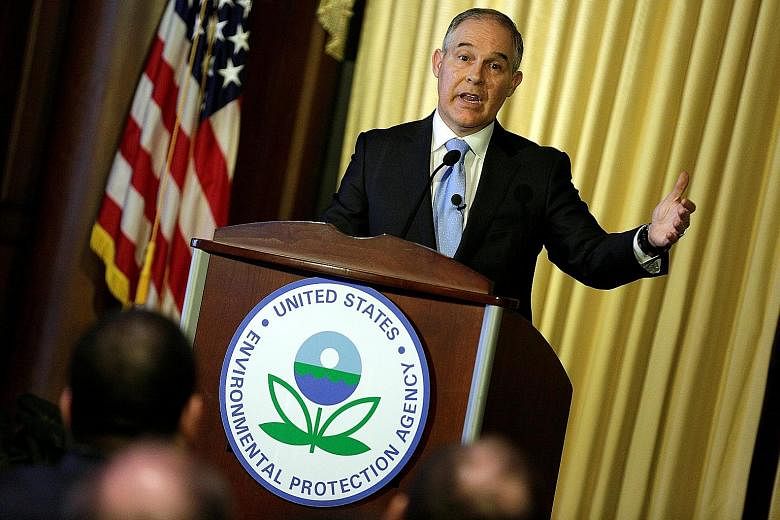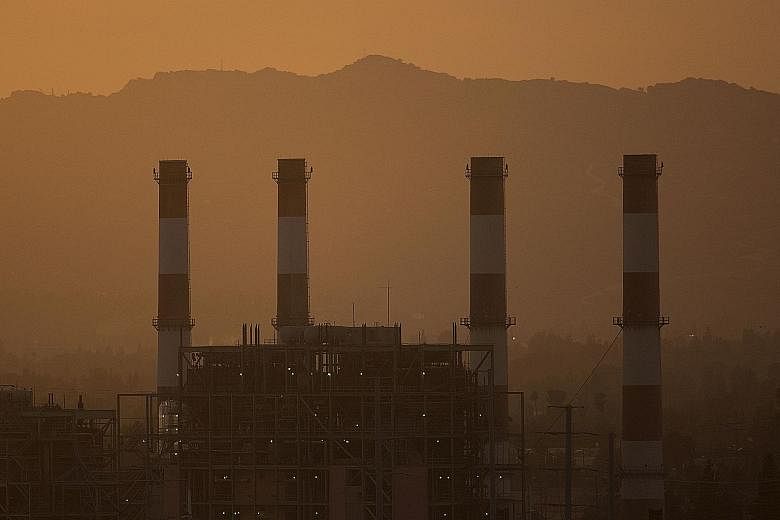WASHINGTON • The White House has hit back at criticism of President Donald Trump's decision to exit a global climate deal, accusing Europe of trying to "shackle" the US economy and refusing to acknowledge climate change is real.
With the United States virtually isolated on the world stage, a string of administration officials went on the offensive on Friday to justify Mr Trump's decision to abandon the 195-nation Paris deal curbing global emissions.
Mr Trump's top climate adviser Scott Pruitt said: "The world applauded when we joined Paris. And you know why? I think they applauded because they knew it would put this country at a disadvantage.
"The European leaders, why do they want us to stay in? They know it will continue to shackle our economy," said Mr Pruitt, who serves as Mr Trump's Environment Protection Agency administrator.
That combative tone came amid a wave of condemnation from around the world and as Mr Trump and his aides refused to say whether the President believes climate change is real, in line with the global scientific consensus.
Mr Trump ignored the question when asked by journalists during an unrelated event with law-enforcement officers, although he did joke that his decision on Thursday had proven "controversial".
Mr Pruitt and White House press secretary Sean Spicer were also among those who refused to answer repeated questions on the subject.
Instead, Mr Pruitt lashed out, saying "we have nothing to be apologetic about as a country", despite the US being the world's second-largest emitter of greenhouse gases after China. "We have taken significant steps to reduce our CO2 footprint," he said. "Truly, Paris at its core was a bunch of words committed to very, very minimal environmental benefit and costs this country a substantial amount of money."
That message is likely to play well with Mr Trump's Republican base, which reveled in defeating what Mr Pruitt called the "environmental left" and "climate exaggerators".
Expressions of shock and regret poured in from around the world, including from Pacific islands - at risk of being swallowed by rising seas - which accused Washington of "abandoning" them.
Mr Trump's decision has also sparked a domestic backlash, with state governors, city mayors and powerful companies drawing up plans to meet the Paris pact's greenhouse gas emission targets.
"Here's what is most important for the world to understand: In the US, emission levels are determined far more by cities, states and businesses than they are by our federal government," said former New York mayor Michael Bloomberg.
In Paris yesterday, Indian Prime Minister Narendra Modi vowed after meeting French President Emmanuel Macron to go "above and beyond" the Paris accord to fight climate change. Mr Modi said it was "part of the world's shared heritage" and India would "continue working on this... above and beyond the Paris accord".
German Chancellor Angela Merkel, the European Union's most powerful leader, also pledged "more decisive action than ever" to protect the climate after the US' "highly regrettable" decision.
European Council President Donald Tusk said the EU is "stepping up our cooperation on climate change with China" after a summit with Chinese Premier Li Keqiang, although EU officials said the two sides failed to endorse a joint statement due to a separate trade row.
In a nationalistic "America First" announcement on Thursday, Mr Trump said he was withdrawing from a United Nations-backed deal that imposes "draconian financial and economic burdens" on the US while going too easy on economic rivals China, India and Europe. Mr Trump offered no details about how, or when, a formal withdrawal would happen. At one point, he suggested a renegotiation could take place, an idea that was unceremoniously slapped down by partners.
"There is nothing to renegotiate here," EU climate commissioner Miguel Arias Canete told reporters in Brussels.
AGENCE FRANCE-PRESSE


